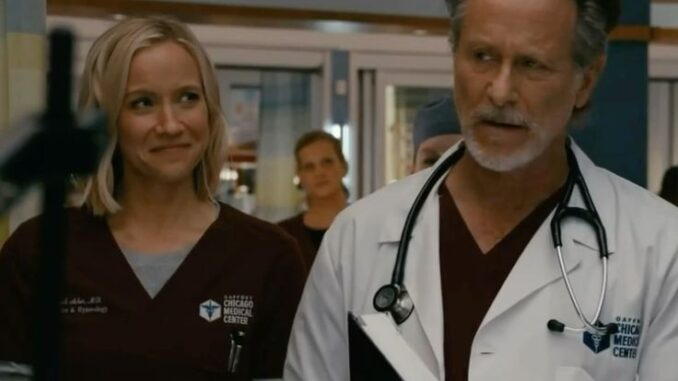
A tremor ran through the meticulously organized chaos of Gaffney Chicago Medical Center, not from a surging influx of trauma cases, but from an announcement that rippled far beyond its sterile white walls. After a decade of anchoring the frantic rhythm of the emergency department, Marlyne Barrett, the steadfast heart of “Chicago Med,” is stepping back. The news, concise and clinical, carries an emotional weight that no medical chart could ever capture, leaving fans with a collective pang and a gnawing question: Maggie Lockwood’s future uncertain.
For ten seasons, Marlyne Barrett was Maggie Lockwood, blurring the lines between actor and character with a seamless grace. A decade in television is not merely a span of years; it is a tapestry woven with countless hours of dedication, character development, and the quiet, consistent presence that makes a fictional world feel undeniably real. Barrett didn’t just play Maggie; she embodied her – the unflappable charge nurse with a scalpel-sharp wit, a heart as expansive as the ED itself, and eyes that had seen every facet of human suffering and triumph. She was the bedrock, the North Star by which many a frantic doctor, terrified patient, and flailing resident navigated their days. Her portrayal brought gravitas, authenticity, and an emotional anchor that grounded the often high-stakes drama of the show.
Maggie Lockwood herself was more than a character; she was an institution within the show’s universe. She was the matriarch without a traditional family, the fierce protector of her staff, the unwavering advocate for her patients. We watched her battle cancer with a quiet, fierce resolve, embrace motherhood, navigate complex relationships, and always, always, return to the front lines of healthcare with renewed purpose. Maggie was the embodiment of resilience, her compassion a salve, her authority a comfort. She was the first face many patients saw, and often the one who offered the most profound human connection amidst the relentless beeps and alarms. To imagine the ED without her commanding presence, her quick judgment, her ability to cut through the noise and see the person, is to imagine a vital organ missing from the hospital’s pulsating body.
And now, the stark finality of “Maggie Lockwood’s future uncertain” hangs like a sterile, fluorescent shadow over the beloved character. It’s a phrase that resonates with the real-world anxieties we all face, yet in the context of a fictional narrative, it’s a gut punch. Is she leaving the ED for a new opportunity? Is she facing another health battle? Or is her story ending in a way that viewers are not yet prepared to contemplate? This uncertainty, often a powerful narrative device, feels particularly poignant here. It refuses to offer the closure viewers crave for a character who has given so much of herself, creating an unsettling silence where there should be a clear note of farewell or a hopeful glimpse into a new chapter. The ominous “MD07” that might mark this turning point only adds to the mystery, hinting at a specific medical crisis or a profound decision that will forever alter Maggie’s trajectory, leaving us to speculate on the nature of the unseen wound, the unspoken diagnosis that dictates her fate.
The departure of Marlyne Barrett and the uncertain future of Maggie Lockwood mark more than just an actor leaving a role or a storyline reaching a critical juncture. It signifies the end of an era for “Chicago Med,” a poignant reminder of the transient nature of even the most beloved television families. It leaves a void that will be felt not just by the fictional doctors and nurses of Gaffney, but by the millions of viewers who invited Maggie Lockwood into their homes, season after season, for a decade. While the show will undoubtedly continue, forever changed, the unwavering spirit and compassionate strength that Marlyne Barrett infused into Maggie will remain an indelible part of its legacy, an echo of an unanswered question, and a testament to the profound connection we form with the characters who become, in their own quiet way, part of our lives.
